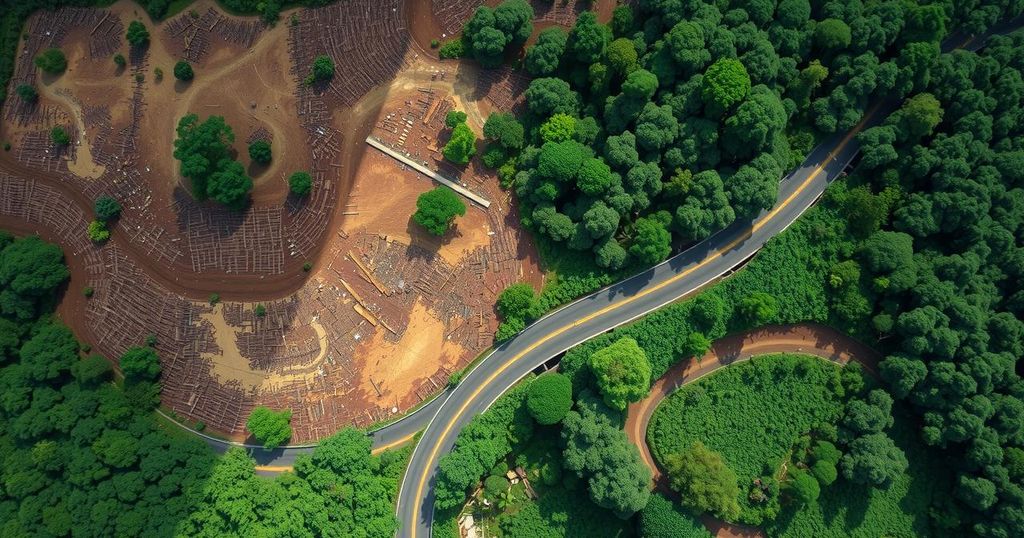Brazil is clearing protected Amazon rainforest to build a highway for COP30, raising environmental and social concerns. The four-lane Avenida Liberdade aims to ease Belém’s congestion but threatens local livelihoods and wildlife. Experts criticize the project, calling it a paradox to the summit’s climate goals as the destruction of habitats heralds further deforestation. COP30 will focus on updated emissions commitments, contrasting with the restrictive conditions in previous host countries.
Brazil is preparing to host COP30, the United Nations’ climate summit, in Belém from November 10 to November 21, which will see attendance from approximately 50,000 individuals, including numerous world leaders. However, a controversial aspect has emerged, as significant portions of the protected Amazon rainforest are currently being cleared to construct a highway intended to enhance access to the summit.
The proposed four-lane highway, termed Avenida Liberdade or the ‘Avenue of Liberty,’ will span tens of thousands of acres and aims to alleviate traffic congestion in Belém, a city with over two million residents. The Para government indicates that the new road will integrate with two existing highway systems and will provide essential access for the Belém Metropolitan Region. Over a distance of 13 kilometers, heavy machinery is actively clearing land to facilitate the construction, with approximately 20 percent of the work completed by November 2024.
Local resident Claudio Verequete expressed concern regarding the destruction of the land where açaí trees previously thrived, informing that his family’s source of income has been obliterated. He remarked, “Everything was destroyed. Our harvest has already been cut down. We no longer have that income to support our family.” He fears future encroachments on their land without proper compensation, leaving them vulnerable.
Despite these local challenges, the Brazilian government, led by President Luiz Inacio Lula da Silva, has defended the highway project. Lula stated that the coming COP30 would focus on the Amazon’s needs and showcased Brazil’s initiatives for its protection. Adler Silveira, a state infrastructure secretary, called the highway a “sustainable highway” designed to improve mobility while incorporating wildlife crossings and bike lanes to mitigate environmental impacts.
Experts, however, are skeptical of these claims. Professor Silvia Sardinha highlighted the immediate losses caused by deforestation, indicating that the destruction of habitats will severely restrict wildlife movement and survival. She criticized the conversations surrounding the summit, noting that they often occur “at a very high level” without addressing the concerns of local communities like those affected by the highway.
Rachael Garrett, a conservation and development professor, pointed out that creating highways within the rainforest could lead to increased deforestation, potentially impacting the Amazon’s vast biodiversity and its role in mitigating climate change. As the Amazon comprises the planet’s largest rainforest and holds a significant portion of its freshwater resources, such developments pose grave concerns.
This year’s COP30 is particularly noteworthy, as it coincides with nations needing to present updated commitments to reduce greenhouse gas emissions. The summit’s location was chosen partly due to Brazil’s reputation for permitting protests and free speech, a contrast to the restrictions faced in previous host nations like Azerbaijan and the United Arab Emirates.
The construction of a highway in the Amazon to facilitate COP30 raises significant environmental and social concerns. While the Brazilian government advocates for the project as a means to improve infrastructure, local residents suffer the consequences of deforestation and loss of livelihood. Experts remain concerned about the broader impacts on biodiversity and the effectiveness of proposed sustainability measures. As the world looks to Brazil for climate leadership, the juxtaposition of this highway project against the summit’s objectives presents a paradox that warrants critical examination.
Original Source: www.firstpost.com




